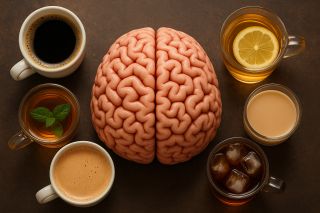Every day, the choices we make, even down to what we sip, profoundly influence our brain health. With countless beverages available, discerning which ones genuinely support cognitive function can feel overwhelming. Fortunately, science consistently points to two remarkable contenders that rise above the rest. These are the 2 best drinks you can incorporate into your daily routine to fuel a sharper mind and enhance overall well-being.
The Power of Your Daily Sip
Imagine boosting your focus, improving your mood, and even protecting your brain against decline, all with a simple, enjoyable beverage. While sugary sodas and processed drinks can subtly chip away at your cognitive vitality, certain natural sips offer powerful neuroprotective benefits. This guide will reveal the latest research behind these brain-friendly choices, offering clear insights into their optimal consumption and any important considerations.
Coffee: A Top Brain-Boosting Brew
Coffee stands as one of the world’s most popular beverages, with a significant majority of adults enjoying its invigorating effects daily. Beyond its role as a morning ritual, research increasingly highlights coffee’s profound impact on brain health. Studies suggest that moderate coffee consumption may offer protective benefits for mood and overall cognitive function.
The magic behind coffee’s brain benefits lies in several key mechanisms. Its compounds can alter neurotransmitter activity, influencing how your brain communicates. Furthermore, coffee polyphenols contribute immune-modulating and antioxidant functions, safeguarding brain cells. There’s also evidence that coffee can increase neuroplasticity by boosting molecules like Brain-Derived Neurotrophic Factor (BDNF), crucial for learning and memory.
Optimal Coffee Intake & Key Considerations
While coffee offers numerous advantages, mindful consumption is crucial. The primary concern revolves around caffeine. Most healthy adults should limit caffeine intake to 400 mg or less per day. Individual responses to caffeine vary significantly; some may experience jitters or anxiety, while others metabolize it differently.
Timing is also vital. Consuming caffeinated coffee too late in the day can severely disrupt sleep, which is detrimental to brain health. Pregnant or breastfeeding women should exercise extra caution and consult their doctor regarding caffeine limits. For most, a sweet spot of 2–4 cups per day, ideally before mid-afternoon, appears most beneficial. Even decaffeinated coffee may provide some brain benefits from its polyphenol content, offering an alternative for those sensitive to caffeine.
Tea: An Ancient Elixir for Modern Minds
For thousands of years, tea has been revered not just as a beverage but as a source of well-being. Modern science now confirms many of these traditional beliefs, identifying tea as another one of the 2 best drinks for brain health. Numerous reviews and meta-analyses point to diverse cognitive benefits from regular tea consumption, particularly green and black varieties. Optimal intake often falls within 1.5 to 3 cups daily.
Like coffee, tea is rich in powerful molecules called polyphenols. Epigallocatechin gallate (EGCG), abundant in green tea, has been extensively studied for its potential to modulate brain inflammation and metabolic pathways. Another unique compound, L-theanine, an amino acid found in tea, is linked to improved brain function and is renowned for its anti-anxiety effects, promoting a calm, focused state.
Brewing for Brain Benefits & Cautions
Similar to coffee, caffeine content is a primary consideration for tea drinkers. Black tea typically contains the highest caffeine levels, while green and herbal teas are generally lower. Understanding the caffeine content of your chosen brew is important, especially when consumed in the afternoon or evening to avoid sleep disruption.
While tea does contain oxalates, the risk of kidney stones from typical consumption is low for most individuals. To maximize brain benefits, aim for 2-3 cups of green or black tea daily, ideally consumed earlier in the day to avoid caffeine-related sleep issues.
Actionable Steps for Smarter Sips
Ready to harness the brain-boosting power of these incredible beverages? Here are practical steps to integrate them effectively into your lifestyle:
- Mind Your Caffeine Intake: Establish a personal daily caffeine limit and stick to it. Be aware of your body’s unique sensitivity.
- Prioritize Quality Over Quantity: Opt for plain, unsweetened coffee and tea. Avoid high-calorie, sugary concoctions that negate their health benefits.
- Time Your Consumption Wisely: Consume caffeinated beverages before mid-afternoon to ensure restful, restorative sleep, which is paramount for brain health.
- Listen to Your Body: Pay attention to how coffee and tea make you feel. Adjust your intake or switch to decaf/herbal options if you experience adverse effects.
- Explore Decaf and Herbal Options: Don’t underestimate the power of decaffeinated coffee or herbal teas, which can still provide antioxidants and soothing benefits without the stimulating effects of caffeine.
Unlock Your Potential with the 2 Best Drinks
Incorporating these 2 best drinks—coffee and tea—into your daily routine offers a simple yet profound way to support your brain health. From enhancing focus and mood to providing crucial neuroprotection, their benefits are backed by extensive research. By making mindful choices about your daily sips, you empower your brain to perform at its peak, contributing to a vibrant, healthier lifestyle.







